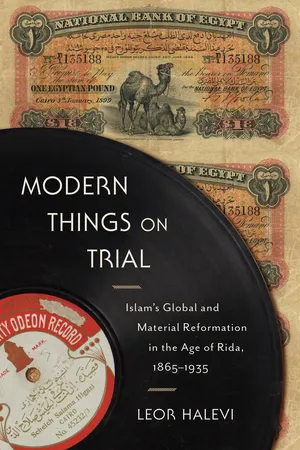
Modern Things on Trial
Islam's Global and Material Reformation in the Age of Rida, 1865-1935
- English
- ePUB (mobile friendly)
- Available on iOS & Android
Modern Things on Trial
Islam's Global and Material Reformation in the Age of Rida, 1865-1935
About This Book
In cities awakening to global exchange under European imperial rule, Muslims encountered all sorts of strange and wonderful new things—synthetic toothbrushes, toilet paper, telegraphs, railways, gramophones, brimmed hats, tailored pants, and lottery tickets. The passage of these goods across cultural frontiers spurred passionate debates. Realizing that these goods were changing religious practices and values, proponents and critics wondered what to outlaw and what to permit.
In this book, Leor Halevi tells the story of the Islamic trials of technological and commercial novelties of the late nineteenth and early twentieth centuries. He focuses on the communications of an entrepreneurial Syrian interpreter of the shari'a named Rashid Rida, who became a renowned reformer by responding to the demand for authoritative and authentic religious advice. Upon migrating to Egypt, Rida founded an Islamic magazine, The Lighthouse, which cultivated an educated, prosperous readership within and beyond the British Empire. To an audience eager to know if their scriptures sanctioned particular interactions with particular objects, he preached the message that by rediscovering Islam's foundational spirit, the global community of Muslims would thrive and realize modernity's religious and secular promises.
Through Rida's international correspondence, Halevi argues that religious entanglements with new commodities and technologies were the driving forces behind local and global projects to reform the Islamic legal tradition. Shedding light on culture, commerce, and consumption in Cairo and other colonial cities, Modern Things on Trial is a groundbreaking account of Islam's material transformation in a globalizing era.
Frequently asked questions
Information
Table of contents
- Cover
- Title Page
- Copyright
- Contents
- List of Maps and Figures
- Acknowledgments
- Prologue: The Parable of the Montgolfière and the Translation of Haleby’s Corpse
- Introduction: Good Things Made Lawful: Euro-Muslim Objects and Laissez-Faire Fatwas
- 1. The Toilet Paper Fatwa: Hygienic Innovation and the Sacred Law in the Late Imperial Era
- 2. Fatwas for the Partners’ Club: A Global Mufti’s Enterprise
- 3. In a Material World: European Expansion from Tripoli to Cairo
- 4. Paper Money and Consummate Men: Capitalism and the Rise of Laissez-Faire Salafism
- 5. The Qurʾan in the Gramophone: Sounds of Islamic Modernity from Cairo to Kazan
- 6. Telegraphs, Photographs, Railways, Law Codes: Tools of Empire, Tools of Islam
- 7. Arabian Slippers: The Turn to Nationalistic Consumption
- 8. Lottery Tickets, Luxury Hotels, and Christian Experts: Economic Liberalism Versus Islamic Exclusivism in a Territorial Framework
- Conclusions
- Notes
- Selected Bibliography
- Index